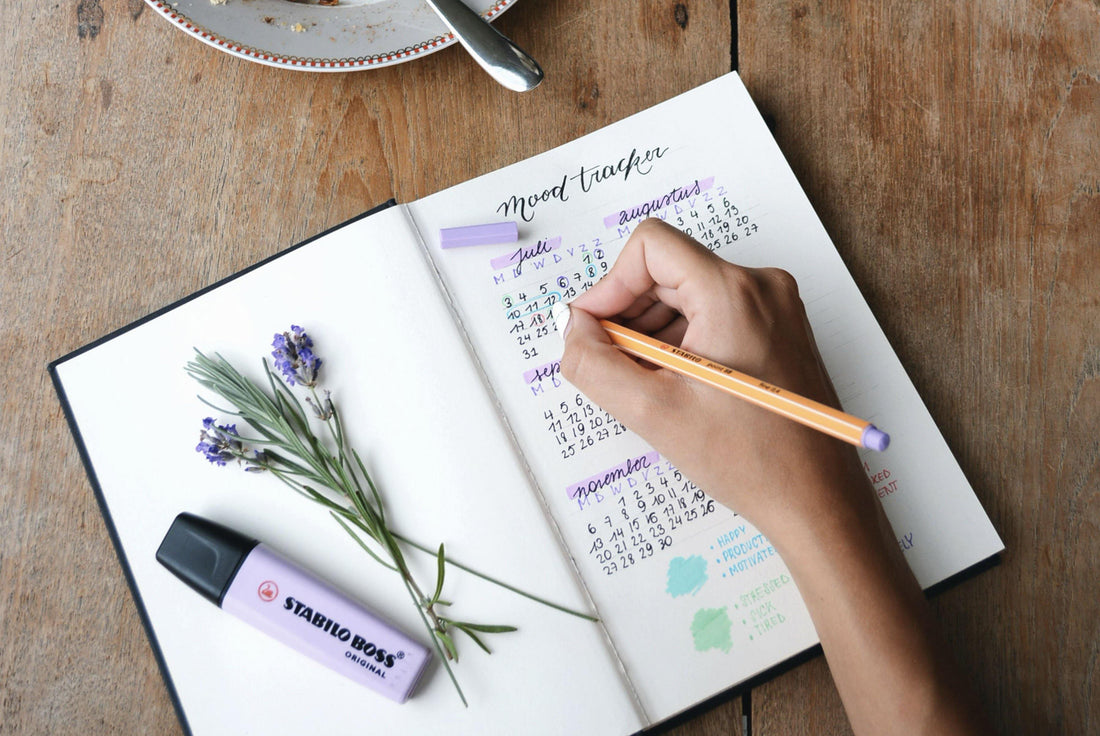You know that ‘Sunday evening’ feeling you get as the weekend comes to a close? It’s like time has flown by faster than you were expecting; one minute you were having fun, and the next, you’re back to the grind again. Setting your intentions is a great way to help you feel more relaxed about the week ahead and increase your productivity. In this post, we’re going to take you through 5 steps to help you be more effective.
Anyone into bullet journaling will know that a dotted journal or notebook is made for getting your thoughts down, planning out your life, making lists etc. This process of organising your ideas, reflections and plans is thought to increase productivity, improve your mood and increase habit formation.
“The behavioural patterns we repeat the most often [become] etched into our neural pathways.” – Psychology Today
However, your intentions are more than just a ‘to do’ list of tasks. They’re steps you can take to make your days more effective, and to help you accomplish any goals you have, such as learning a new skill, completing a project, or changing your mindset about something. By creating intentions, you’re setting yourself up to tackle things you find difficult or you need to improve upon - for example:
Perhaps you want to feel more confident about yourself and your skills. You’d start by writing that out as a goal in your journal, then think of the ways you need to act with intention to achieve it. Your intentions might include reciting positive reinforcement statements in the morning or making sure you give yourself breathing space before a meeting, if you’re feeling a bit nervous.
Ideally, you want to start out with a couple intentions to work towards at a time - particularly when you’re starting out - to ensure you have a clear direction. We’ve put together the steps below to assist you in choosing which intentions you’ll be focusing on throughout the week.
1. Choose your intentions
What are the things you’re passionate about? What are you striving for? When setting your intentions, this is what you should have in mind. They might include:
- Breaking a habit or starting a new one
- Learning to speak a new language
- Developing your career
- Improving your mood
Intentions are the steps that will bring you closer to your goals. Every time you focus, and are intentional about something, you move towards a goal. Now you need to discover what it’ll take to get you there.
2. Ask yourself these questions
- What do I want to achieve?
- How am I going to achieve it?
- What mindset do I need?
- What does success look like this week?
The answers to these questions will form smaller parts of your overall goals. Once you’ve chosen these weekly goals, break them down even further into tasks for each day, and write them in your journal. After you’re done, think about what you need to do to complete them. These will become your intentions.
Keep your intentions brief so you’ll remain focused. This will give you a sense of accomplishment for finishing them.
It‘s useful to have your intentions written down in places you’re going to see them regularly - you could use sticky notes to put them around your workstation or on the fridge; add them as reminders on your phone; or ask a friend to check in with you about them. Do whatever you need to do to keep yourself on target.
3. Each day, check your intentions
Before you start your day, take a look at your journal and see what you’ve written down, then pick one intention that will be your main focus for the day. You’ll need to keep referring back to your journal in order to build a habit of being intentional throughout the day, the week, and over the coming months.
4. Reflect on how you did that day
Before you turn in for the day, check your journal again and think about your intentions. How did you do? Were you able to stick to them? Spend a few minutes reflecting on what went well, and what you could do better, then write them down.
5. Look back on what you’ve achieved
How did being intentional go this week? Did you stick to your intentions each day? If you did, that’s great! If not, don’t feel bad - try paring down your intentions or find more effective ways to remind yourself to be intentional throughout the day.
It might be helpful to write a note to yourself using the following prompts:
- How you did with your tasks
- How you’re feeling about the choices you made and what happened
- How you want to approach the next week to stay on your journey
By writing these thoughts down, you can review them as time passes and see your progress. Even if you haven’t achieved your goals yet, you’re still growing and learning, and being more mindful of your daily approach.
Conclusion
Whatever you do, keep going. It won’t happen overnight, but by choosing to focus, set yourself up with a positive mindset, and make good choices, you’re taking the right steps to complete your goals.
The repetition of being intentional, and aware of what you’re doing and the choices you make, will help you to form better habits, and ultimately, be more productive. Psychologists say “the behavioural patterns we repeat the most often [become] etched into our neural pathways” - if you do something again and again over the course of two to three weeks, it becomes automatic.

